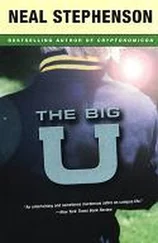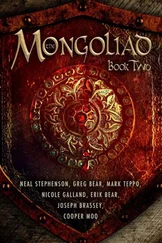Neal Stephenson - The Mongoliad - Book One
Здесь есть возможность читать онлайн «Neal Stephenson - The Mongoliad - Book One» весь текст электронной книги совершенно бесплатно (целиком полную версию без сокращений). В некоторых случаях можно слушать аудио, скачать через торрент в формате fb2 и присутствует краткое содержание. Город: Las Vegas, Год выпуска: 2012, ISBN: 2012, Издательство: 47North, Жанр: Эпическая фантастика, Фэнтези, на английском языке. Описание произведения, (предисловие) а так же отзывы посетителей доступны на портале библиотеки ЛибКат.
- Название:The Mongoliad: Book One
- Автор:
- Издательство:47North
- Жанр:
- Год:2012
- Город:Las Vegas
- ISBN:978-1-61218-236-0
- Рейтинг книги:5 / 5. Голосов: 1
-
Избранное:Добавить в избранное
- Отзывы:
-
Ваша оценка:
- 100
- 1
- 2
- 3
- 4
- 5
The Mongoliad: Book One: краткое содержание, описание и аннотация
Предлагаем к чтению аннотацию, описание, краткое содержание или предисловие (зависит от того, что написал сам автор книги «The Mongoliad: Book One»). Если вы не нашли необходимую информацию о книге — напишите в комментариях, мы постараемся отыскать её.
The Mongoliad: Book One — читать онлайн бесплатно полную книгу (весь текст) целиком
Ниже представлен текст книги, разбитый по страницам. Система сохранения места последней прочитанной страницы, позволяет с удобством читать онлайн бесплатно книгу «The Mongoliad: Book One», без необходимости каждый раз заново искать на чём Вы остановились. Поставьте закладку, и сможете в любой момент перейти на страницу, на которой закончили чтение.
Интервал:
Закладка:
The woman produced a red silk scarf and draped it over Gansukh’s left shoulder. Slowly she pulled it back and forth around his neck. She brought her face close to his and drew a long fingernail under his chin. Her eyes were hazel green and lined with a color that matched her blue outfit. She gave him an exaggerated wink and, as Gansukh laughed, raised the red scarf above her head and pulled it tight between both hands. Matching the beat of the music and the crowd, she tilted her hips up and down, left and right, making the silver bells at her waist dance and ring. Gansukh couldn’t take his eyes off the woman’s slender waist. She smiled knowingly and crooked a finger at him, beckoning him to stand and follow her. Glancing over her shoulder to see that he was still watching her, she began to move toward a small maroon tent set up behind the band.
Gansukh grinned and stood up—and found his way blocked.
“Persian culture is fascinating, isn’t it?” Lian’s hands were on her hips. Gansukh’s grin faltered.
“I…”
“You?”
“She…”
“ She what?”
Gansukh looked over Lian’s head. The woman in blue was standing at the door to the maroon tent. She gave Gansukh a pouty look, pushing out her lower lip, and pulled the tent flap open wide.
“She…has bells.”
Lian gave him a withering look. She has bells?
With a snap, Gansukh broke eye contact with the dancer. “Bells…which would look better on you.” His grin returned.
“Oh, by the heavens.” Lian rolled her eyes. “I leave you alone for—”
“I was hungry,” Gansukh said, trying to change the subject. Remembering the sticks of meat, he offered her one.
“I can see that.” Still the same cold tone.
“I thought you—”
“I did,” she snapped.
Gansukh realized she was holding a broad piece of cloth, and when he stared at it uncomprehendingly, she exhaled noisily and hurled it at his feet before storming off into the crowd.
More confused than ever, he looked at the cup and the sticks of meat in his hands, and finally put the meat in the cup so that he could bend down and pick up the cloth.
It was a silk robe, as blue as the summer sky. An intricate pattern of interwoven tree branches, done in red and gold thread, ran down the front. Small birds nested in the tips, and hidden deep within the snarled bramble, he saw the lean faces of wolves.
It was the most beautiful article of clothing he had ever seen.

After a night of restless sleep, Gansukh was no closer to understanding any of the puzzles that continued to vex him. He was no closer to comprehending the Khagan ’s depression and madness, nor how to reach the man who was lost in an alcoholic stupor. Lian was angry with him, and while he knew he shouldn’t care what a Chinese slave thought, his brain was constantly churning with confusion and frustration about her.
Not to mention the lacquered box. There had to be a way to open it, and while he could simply crush it with the pommel of his sword, such a solution could destroy what lay inside. It remained a tantalizing mystery—a symbol of his inability to fathom the intricacies of a seemingly simple problem.
He had left the box in his chamber, tucked in the inner pocket of the robe Lian had bought him. Then he had left his room, trying to put both out of his mind. The robe hung behind a paper screen. Hiding all of his secrets.
As he wandered around the compound, Gansukh couldn’t shake Master Chucai’s parting words from the other day: You simply need permission, and not from me or the Khagan .
Who, then? And what sort of permission?
Out on the steppe, he needed no permission from anyone. He was in charge of his own life. Even when he traveled with other clansmen, they each knew how to provide for themselves and those who relied upon them for safety and sustenance. They didn’t need to be reminded or commanded. In an arban , each man answered to the others in the squad, and their arban commander answered to the jaghun commander. The jaghun commanders answered to the noyon of their minghan , and so on, up to the Khagan himself. It was a simple chain of command—one that had proven itself effective for many a military campaign.
But if he wasn’t supposed to follow that chain of command, then who was he supposed to answer to?
It wasn’t an impossible riddle. Gansukh couldn’t believe that Master Chucai would waste his time playing such games. He wanted Gansukh to discover some insight—one of Lian’s constant reminders was that a lesson self-learned was much more likely to be remembered than a lesson taught—and he was sure Chucai had inflicted that same aphorism on her during her own education. These sorts of intellectual jabs were always passed on from master to student, generation to generation.
Who had taught Master Chucai? he wondered. Chucai had been an advisor to Genghis Khan; he had been there when Ögedei Khan’s father built the empire. Who had taught him? Gansukh wondered, and then another question posed itself: Whom had Genghis sought permission from?
He hadn’t. But that wasn’t the whole answer. He had bound the clans to him. Had he asked their permission? No, they had come to him. Why?
As he mulled over that question, he noticed he had wandered close to the quarters of the Day Guard, unconsciously summoned by grunts of exertion and the sound of flesh on flesh and of bodies striking packed earth. The morning wrestling practice. Gansukh had watched them on a few previous occasions; early in his education, Lian had suggested befriending some of the Imperial Guard as a way of helping his standing at court. He hadn’t acted upon her idea previously, citing the excuse that having drawn the ire of Munokhoi on several occasions, there was the distinct possibility that seeking out the Torguud might be more foolish than wise, but now, with the question of the source of Genghis Khan’s leadership in his mind, he reconsidered his standing with the Torguud .
Munokhoi might be able to command a certain amount of authority among the Day Guard by virtue of his rank, but given the reaction he’d gotten from the Khevtuul (the Night Guard) after the incident in the garden, Gansukh suspected Munokhoi wasn’t well liked. Munokhoi’s jaghun was only a portion of the whole Torguud , and it was likely the remainder of the Day Guard might have a similar lack of respect for the cruel commander.
Respect among warriors was hard earned and easily lost. There were only a handful of ways in which a man could win and keep the respect of his peers.
Wrestling was one of them.
The reigning wrestling champion of the Imperial Guard was Namkhai, a tall, heavy-set grappler who—as Gansukh had seen—invariably broke into a chortle and grinned like a demon as his opponent showed any sign of nerves. Some capitulated as soon as he started to smile, knowing they had already shown too much weakness. Others held out longer, until Namkhai caught them in a bear hug and began to cackle in their ears. Gansukh wasn’t sure how he would react to Namkhai’s gambit, but he wanted to find out. He wanted to find out what it took to change the expression on the wrestler’s face.
He wanted to find out what it took to earn the man’s respect.
Gansukh was no stranger to wrestling. Chagatai Khan’s own personal guard held regular wrestling matches, and he had won a number of bouts. There was a difference in the rules, though, between those observed by Chagatai’s guards and by the Torguud . On the wrestling field of Karakorum, a fighter could not grab the legs of his opponent. The wrestlers could only grip their opponent’s arms or upper body in their efforts to throw the other off balance. A match was lost when a wrestler’s upper body, elbow, or knee touched the ground.
Читать дальшеИнтервал:
Закладка:
Похожие книги на «The Mongoliad: Book One»
Представляем Вашему вниманию похожие книги на «The Mongoliad: Book One» списком для выбора. Мы отобрали схожую по названию и смыслу литературу в надежде предоставить читателям больше вариантов отыскать новые, интересные, ещё непрочитанные произведения.
Обсуждение, отзывы о книге «The Mongoliad: Book One» и просто собственные мнения читателей. Оставьте ваши комментарии, напишите, что Вы думаете о произведении, его смысле или главных героях. Укажите что конкретно понравилось, а что нет, и почему Вы так считаете.







